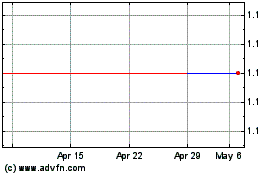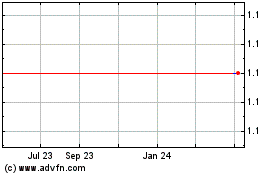U.S. Report Allows Russian Pipeline Project to Proceed, for Now
February 21 2021 - 1:46PM
Dow Jones News
By Brett Forrest
The State Department in a report to Congress didn't name new
companies as targets for sanctions related to an $11 billion
pipeline designed to transmit Russian natural gas to Germany,
allowing work on the pipeline to continue unabated for now.
Some Republican lawmakers criticized the State Department over
the Nord Stream 2 report, which was required by Congress, and both
Republicans and a key Democrat requested an explanation of the
administration's position.
The Trump administration, urged by Congress, signed laws in 2019
and 2020 that halted the pipeline's construction for more than a
year until its resumption earlier this month. The Biden
administration has called the project a "bad deal," but Nord Stream
2 is shaping into a pressure point between the new administration
and a bipartisan Congressional coalition that has assailed the
project.
The report was expected to provide a list of companies involved
in pipeline construction and are therefore subject to U.S.
sanctions. Instead, the State Department named two entities
previously sanctioned by the Trump administration -- the main
pipe-laying vessel and its owner -- along with 18 companies, mostly
insurers, that already have left or were leaving the project.
The failure to name any new targets for sanctions allows the
work to continue while also providing the administration with time
for discussions with Germany about the project and to formulate its
own policy on the pipeline.
The State Department sent the report to lawmakers on Friday but
didn't publicly release it or respond to questions about its
findings. The Wall Street Journal reviewed a copy of the report
this weekend. German officials didn't immediately respond to a
request for comment.
Sen. Jim Risch (R., Idaho), the top Republican on the Senate
Foreign Relations Committee, called the report misleading.
"Maritime tracking information makes it clear that ships not
covered in today's report are currently active in supporting Nord
Stream 2 construction," he said in a statement. "The
administration's decision to ignore these activities demands an
immediate explanation."
The pipeline if completed would allow Gazprom, Russia's
gas-export monopoly, to all but abandon the Ukrainian transit
system that for decades has handled the bulk of Russian gas
deliveries to Europe.
U.S. lawmakers worry that Nord Stream 2 would strengthen
Russia's grip on the European energy market, put an end to any
geopolitical leverage Ukraine may still have in its struggle with
Russia, and increase Moscow's influence on the continent. The
pipeline is more than 90% completed, with about 100 miles
remaining.
Friday's report cites Germany's commitment to the pipeline and
rejection of potential U.S. sanctions related to the project, which
it sees as "an attack on German and EU sovereignty," the report
says. The German government, which is phasing out the domestic
usage of coal and nuclear energy, considers Russian gas deliveries
vital.
The Biden administration is eager to improve ties with Berlin, a
critical European ally, which were strained by former President
Donald Trump's skepticism of the NATO alliance and threats of
tariffs on German goods, and by German Chancellor Angela Merkel's
criticism of Mr. Trump's "America First" foreign policy.
Mr. Trump publicly opposed the pipeline, at one point urging
Berlin to halt construction as the price of averting a trade war
with the U.S. Berlin and Russian officials have characterized Nord
Stream 2 as a solely commercial venture advancing energy security
for Europe.
The Biden administration has opened talks with Berlin on the
future of the pipeline, including "threats of sanctions against
companies involved in the construction of Nord Stream 2," a German
official said.
In a statement Saturday, Sen. Jeanne Shaheen (D., N.H.), a
principal advocate of the Nord Stream 2 sanctions legislation, said
that the law "laid the groundwork for effective action to stop the
pipeline without unnecessarily harming trans-Atlantic
relations."
"I look forward to being briefed by the Biden administration on
additional steps they can take to stop the threat posed by the
completion of the Nord Stream 2 pipeline," Ms. Shaheen wrote.
Mr. Biden hasn't articulated a detailed policy on the
pipeline.
"We've been clear for some time that Nord Stream 2 is a bad deal
and that companies risk sanctions if they are involved," State
Department spokesman Ned Price said Friday, before the report was
delivered. "Our goal in all of this is to reinforce European energy
security and safeguard against predatory behavior."
A National Security Council spokeswoman didn't immediately
respond to a request for comment.
The resumption of work on the pipeline on Feb. 6 should have
triggered the application of mandatory sanctions. The
administration thus far hasn't imposed them. The administration
could waive the application of sanctions under a national-interest
clause contained in the 2020 law.
Calling Friday's report a gift to Russia, Mr. Risch wrote that
the report shows that the administration "has reversed itself" and
that it now "believes it is a good idea to allow the completion of
Nord Stream 2."
--William Mauldin contributed to this article.
Write to Brett Forrest at brett.forrest@wsj.com
(END) Dow Jones Newswires
February 21, 2021 13:31 ET (18:31 GMT)
Copyright (c) 2021 Dow Jones & Company, Inc.
PJSC Gazprom (PK) (USOTC:OGZPY)
Historical Stock Chart
From Mar 2024 to Apr 2024

PJSC Gazprom (PK) (USOTC:OGZPY)
Historical Stock Chart
From Apr 2023 to Apr 2024
